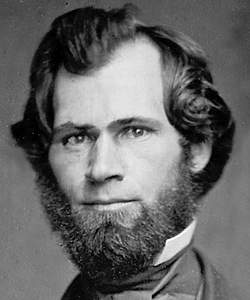Galusha Aaron Grow (Congressional Biographical Directory)
Reference
GROW, Galusha Aaron, a Representative from Pennsylvania; born in Ashford (now Eastford), Windham County, Conn., August 31, 1823; moved to Glenwood, Susquehanna County, Pa., in May 1834; attended the common schools and Franklin Academy, Susquehanna County; graduated from Amherst College, Amherst, Mass., in 1844; studied law; was admitted to the bar of Susquehanna County in 1847 and practiced; elected as a Democrat to the Thirty-second, Thirty-third, and Thirty-fourth Congresses and as a Republican to the Thirty-fifth, Thirty-sixth, and Thirty-seventh Congresses (March 4, 1851-March 3, 1863); chairman, Committee on Territories (Thirty-fourth and Thirty-sixth Congresses); unsuccessful Republican nominee for Speaker in 1857; Speaker of the House of Representatives (Thirty-seventh Congress); delegate to the Republican National Conventions in 1864, 1884, and 1892; president of the Houston & Great Northern Railroad Co. of Texas 1871-1876; returned to Pennsylvania and engaged in lumber, oil, and soft-coal pursuits; elected as a Republican to the Fifty-third Congress to fill the vacancy caused by the death of William Lilly; reelected to the Fifty-fourth and to the three succeeding Congresses and served from February 26, 1894, to March 3, 1903; chairman, Committee on Education (Fifty-fourth through Fifty-seventh Congresses); declined a renomination in 1902; died in Glenwood, near Scranton, Pa., March 31, 1907; interment in Harford Cemetery, Harford, Pa.
“Grow, Galusha Aaron,” Biographical Directory of the United States Congress, 1774 to Present, http://bioguide.congress.gov/scripts/biodisplay.pl?index=G000507.
Galusha Aaron Grow (American National Biography)
Scholarship
Once he was sure the Democratic party no longer spoke for free homesteads because it had fallen under the sway of southerners, Grow became a Republican. After passage of the Kansas-Nebraska Act in 1854, he helped organize the House Republicans. Newspaperman Horace Greeley called him a "young chevalier" who led the opposition for a free Kansas against the proslavery forces and the Democratic administration's policies in that territory. Grow's constant badgering of southerners triggered both a fistfight on the House floor with Lawrence Keitt of South Carolina and a challenge to a duel by Lawrence Branch of North Carolina.
His combativeness and leadership role among the radical Republicans enabled Grow to become Speaker of the House after the party's successes in 1860. His defiant attitude did not mellow. He warned that no foot of American soil would be sacrificed to the secessionists until it was first "baptized in fire and blood." The southern conspiracy against the Constitution had to be totally destroyed, he insisted. For many years afterward, he clung to the conspiracy theory and remained one of the last Republicans to abandon "bloody shirt" politics of recriminations against the Democrats and the South.
His combativeness and leadership role among the radical Republicans enabled Grow to become Speaker of the House after the party's successes in 1860. His defiant attitude did not mellow. He warned that no foot of American soil would be sacrificed to the secessionists until it was first "baptized in fire and blood." The southern conspiracy against the Constitution had to be totally destroyed, he insisted. For many years afterward, he clung to the conspiracy theory and remained one of the last Republicans to abandon "bloody shirt" politics of recriminations against the Democrats and the South.
Robert D. Ilisevich, "Grow, Galusha Aaron," American National Biography Online, February 2000, http://www.anb.org/articles/04/04-00444.html.





